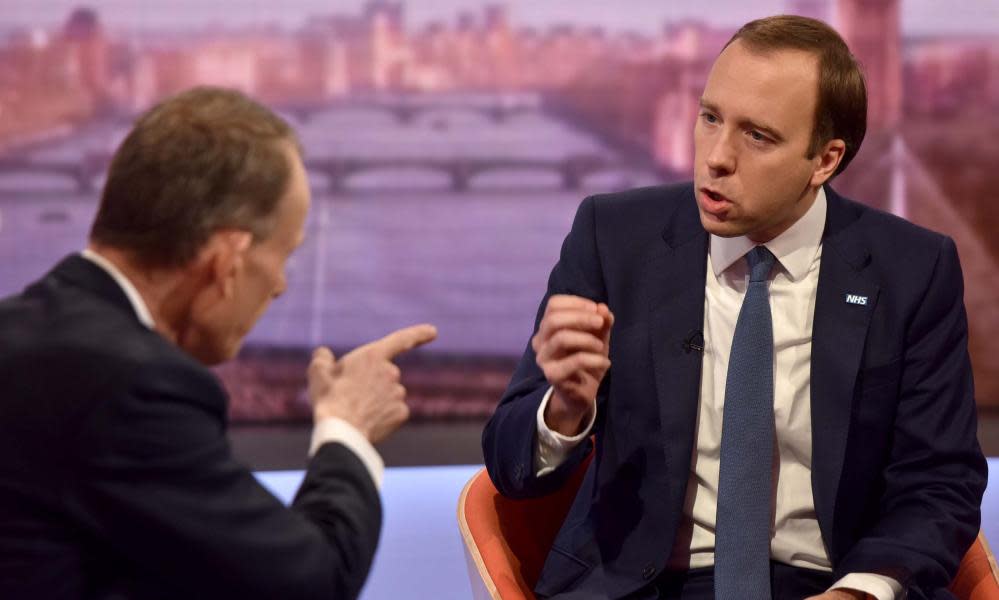The Tories will regret ignoring the pain inflicted by universal credit

Making up excuses on the hoof is difficult. No one truly believes the friend who replies with effusive apologies three days after a text message suggesting a drink: if you care, you reply quickly. Things are a little different if you’re a cabinet minister: ignoring your constituents is generally considered an abdication of professional responsibility, rather than simple bad manners. So Matt Hancock has given himself a headache by claiming to have received absolutely no correspondence from his West Suffolk constituents on universal credit.
The issue of universal credit has rumbled on for months, bobbing beneath the endless Brexit story headlines. It took the Mirror journalist Dan Bloom mere hours to prove that Hancock’s claim, made on the BBC’s Andrew Marr Show, was false: a single mother, 36-year-old Joanne Samson, had emailed her MP on Thursday to explain her desperation at losing £40 per week on universal credit while caring for her autistic son. Given the wealth of problems created by the new single benefit – with the transition period leaving people with nothing to live on for weeks, and when payments do begin, hundreds of thousands finding they are worse off – it remains extremely unlikely that more correspondence hasn’t reached the health secretary.
Hancock claimed jobcentre work coaches were happy and the system was frictionless. He is the first person I’ve heard describe it as such. At a recent conference on universal credit for advice workers, even during tea breaks the attendees were sharing endless horror stories of massive rent arrears, claimants starving themselves through necessity, huge cuts to people’s incomes and, in particular, benefit sanctions worsening under universal credit. Even the landlord lobbying group the Residential Landlords Association has issued research stating that two-thirds of private landlords have experienced tenants in receipt of universal credit going into rent arrears, up from 27% in 2016.
One of the Tories’ main problems is that this parliamentary term has all been about Brexit and internecine squabbling in the cabinet. Domestic policy has been allowed to sprout weeds and grow unruly: no ministers are really tending diligently to policy on social security.

It also seems as if Tory ministers are unaware of how deeply universal credit is likely to hurt the Conservatives politically. It is dismissed time and again as a small tweak to the social security system. Theoretically, it makes sense to pay six separate benefits as one payment. But the entire project – from the IT system to the jobcentre rollout and the benefit calculation – is flawed and discredited. Both Gordon Brown and John Major have warned this government that universal credit will be their poll tax moment: a policy so unpopular in the late 1980s that the public turned against the Tory government, forcing a U-turn.
Today’s Conservatives have banked on there being little outcry over the benefit changes. But the traditional, though misplaced, view that those in receipt of state help are by and large unemployed and marginalised no longer rings true. You can work all the hours available to you, and still earn far below what constitutes a decent living. Millions of people are working for their poverty, because a low minimum wage and a tax credits and housing benefit system mean that large corporations can pay poverty wages and expect the state to pick up the slack.
We have created a system in which companies can continue to report massive profits, while the government is forced to top up their workers’ wages. It’s obscene. Capitalism isn’t working for those toiling to keep the profits flowing, but our politicians are too timid to suggest an alternative. Instead, they blame the working poor for not earning more – as though they have the power to set their wages in an environment where workers’ rights have been crushed.

Who is hit by universal credit? A million homeowners. About 600,000 single parents. Nearly 750,000 households on disability benefit. Two in five households will lose around £52 a week in payments on universal credit: more than six and a half hours’ work a week on the highest level of minimum wage. Theresa May’s feted just-about-managing families will be plunged into the realm of the not-remotely-coping. Food bank use has increased by 52% in areas where universal credit has already been rolled out, according to the Trussell Trust. Millions of working people are struggling already – and hearing May proclaim that “austerity is over” shortly before the government slashes your income feels like a punishment beating.
At the last two Conservative conferences, the party panicked that the housing crisis would cost them their traditional voting base – and there is a grain of truth there. But they should be really worried about the 8 million who will be hit by universal credit when it is fully rolled out by March 2023. As more and more move over to the new benefit, the utter indifference displayed by most Conservatives towards universal credit’s victims is likely to translate to the ballot box.
• Dawn Foster is a Guardian columnist

 Yahoo News
Yahoo News 
